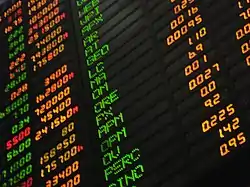| Part of a series on |
| Financial markets |
|---|
 |
| Bond market |
| Stock market |
| Other markets |
| Over-the-counter (off-exchange) |
| Trading |
| Related areas |
In finance, the noisy market hypothesis contrasts the efficient-market hypothesis in that it claims that the prices of securities are not always the best estimate of the true underlying value of the firm. It argues that prices can be influenced by speculators and momentum traders, as well as by insiders and institutions that often buy and sell stocks for reasons unrelated to fundamental value, such as for diversification, liquidity and taxes. These temporary shocks referred to as "noise" can obscure the true value of securities and may result in mispricing of these securities, potentially for many years.[1][2]
References
- ↑ Bodie, Z., Kane, A. and Marcus, A. J. Essentials of Investments, McGraw Hill Irwin, 2013, Chapter 8. ISBN 0078034698
- ↑ The Noisy Market Hypothesis, Wall Street Journal, Jeremy Siegel, June 14, 2006
See also
- Adaptive market hypothesis
- Agent-based computational economics
- Financial economics § Challenges and criticism
- Information cascade
- Noise trader
- Random walk hypothesis § A non-random walk hypothesis
This article is issued from Wikipedia. The text is licensed under Creative Commons - Attribution - Sharealike. Additional terms may apply for the media files.